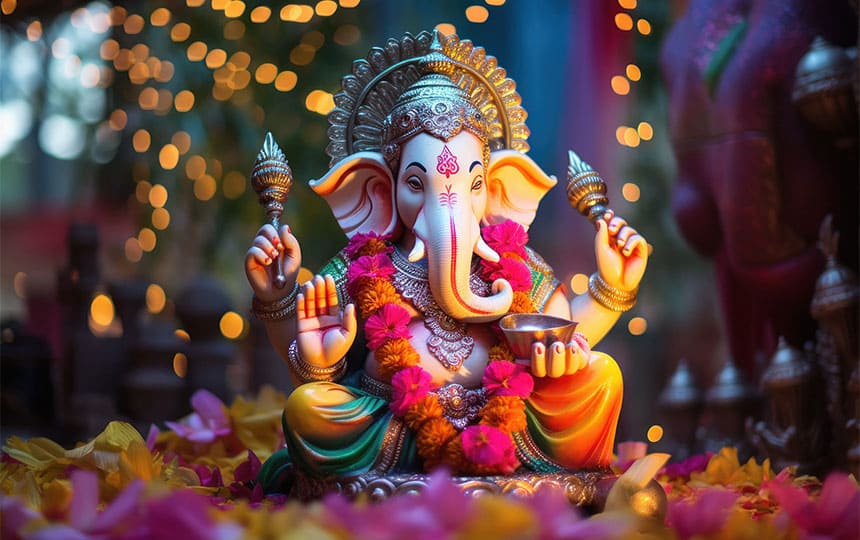
In Hindu tradition, Lord Ganesha, the elephant-headed deity, is revered as the first and foremost deity to be worshipped before commencing any puja or religious ceremony. This practice of placing Lord Ganesha first is deeply rooted in ancient beliefs and customs. In this blog, we will explore the reasons behind this practice, including the significance of Lord Ganesha in Hindu worship, a short story explaining why Ganesha is worshipped first, and answer some frequently asked questions.
Lord Ganesha, also known as Ganapati or Vinayaka, is considered the remover of obstacles and the god of beginnings. His role is crucial in ensuring the success of any venture or undertaking. When you ask, "Why is Lord Ganesha worshiped first?" it boils down to his role as a deity who clears the path of any potential hindrances, making it possible for other deities to be worshiped effectively.
The belief that "why Ganesha is worshiped first" stems from his divine ability to eliminate obstacles and bring prosperity. According to tradition, starting any puja or ritual with Lord Ganesha’s worship ensures that all the plans and activities will be free from obstacles. By honoring him first, devotees seek his blessings to make their endeavors successful.
The tradition of worshiping Lord Ganesha first is rooted in ancient Hindu mythology. According to one popular story, when Lord Shiva and Goddess Parvati were away, Parvati created Ganesha from the dirt of her body and asked him to guard her home. When Shiva returned, he was unaware of Ganesha's identity and tried to enter the house. Ganesha, following his mother's orders, blocked Shiva's entry. Enraged, Shiva severed Ganesha's head. Upon discovering the mistake, Shiva promised to revive Ganesha and gave him the head of an elephant. From then on, Ganesha became the beloved deity worshipped before any other gods to ensure success and smooth proceedings.
Remover of Obstacles: Ganesha is known as "Vighnaharta" or the remover of obstacles. Worshipping him first helps remove any hurdles that might arise in the course of the puja or the new venture being undertaken.

Bringer of Success: Lord Ganesha blesses his devotees with success and prosperity. By invoking him first, devotees seek his blessings to ensure that their efforts are fruitful.
Symbol of New Beginnings: Ganesha represents new beginnings and fresh starts. His worship signifies a new phase, making him an ideal deity to be honored at the start of any important ceremony.
Spiritual Significance: Ganesha's worship is believed to bring peace and harmony. Beginning with his puja sets a positive tone for the entire ritual or event.
Tradition and Culture: Following this tradition is also a way of honoring and maintaining cultural and religious practices that have been passed down through generations.
The belief that "not worshiping Lord Ganesha first may lead to an unsuccessful puja" is widespread. In Hindu rituals, this is considered true because Ganesha is thought to clear the path of any spiritual and material obstacles. If Ganesha is not honored first, it is believed that the puja might face challenges, and the prayers may not be as effective. This practice underscores the importance of starting any religious or spiritual activity with a clean slate, free from potential disruptions.
The tradition of worshipping Lord Ganesha first in every puja is deeply rooted in Hindu mythology and religious practices. Ganesha’s role as the remover of obstacles and the deity of new beginnings makes him an essential part of any auspicious ritual. Whether one strictly follows this tradition or views it as a symbolic gesture, the practice reflects the profound respect and reverence for Lord Ganesha’s divine role in ensuring success and removing obstacles in every endeavor.
Lord Ganesha is worshipped first because he is known as the remover of obstacles and the god of beginnings. His blessings are sought to ensure that the puja is free from any hindrances and is successful.
While it is traditionally believed that not worshiping Lord Ganesha first may lead to an unsuccessful puja, many still choose to begin their rituals with Ganesha to align with the traditional customs and ensure a smooth process.
In various Hindu cultures, Ganesha is worshiped first because of his universal appeal as the deity who clears the way for prosperity and success. This practice transcends regional differences and is a common thread in Hindu rituals.
The elephant head of Lord Ganesha symbolizes wisdom, understanding, and a discerning mind. It represents his ability to overcome obstacles and gain insight, making him a fitting deity to invoke at the start of any new endeavor.
To properly worship Lord Ganesha, start by placing his idol or picture in a clean, dedicated space. Offer him fresh flowers, fruits, and sweets. Recite prayers or mantras dedicated to him, such as the Ganapati Atharvasirsha or Ganesh Chaturthi hymns, and conclude with a sincere wish for success and the removal of obstacles.
For more astrology related content Subscribe us on Youtube
Author : Nikita Sharma